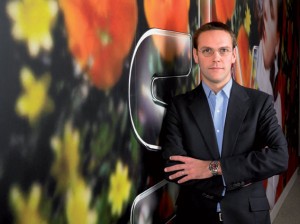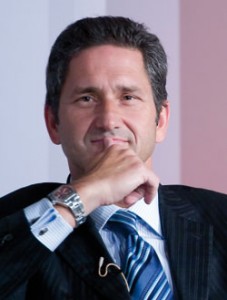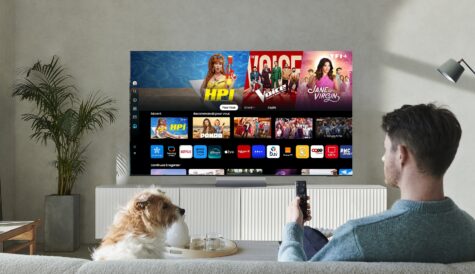James Murdoch and Mike Fries debate future of pay TV at EuroSummit ’13
Liberty Global president and CEO Mike Fries and 21st Century Fox deputy COO and News Corp chairman and CEO James Murdoch have rounded off the CTAM Europe EuroSummit by debating the future of pay TV and bundled services in the face of competition from OTT providers and traditional telcos.
Fries said that cable relies on scale as it is competing everywhere with national platform operators.
“Scale allows me to get better content deals,” he said. “I think consolidation in this market in particular will pick up speed.” He said there was “something wrong” with the level of fragmentation in the European cable business, compared with the situation in the US.
Fries said that Liberty Global’s acquisition of Virgin Media was “in our DNA”. He said the market was more mature in terms of subscriber growth than the likes of Germany but that there was considerable room for business-to-business growth. He said the operator had “zero” small office-home office customers currently.
Fries said that the competitive threat posed by telecom operators laying down fibre was exaggerated. He said UPC was already offering high-speed services such as 100Mbps as basic services that matched the top VDSL speeds. He said he was more worried about telcos behaving irrationally in doing content deals and giving TV services away for free or very little. He said he welcomed strong telco competition because weak telcos tended to compete by cutting prices and undermining the market.
Continuing with the consolidation theme, Fries said that mobile and telecom consolidation is also ready. He said regulators “have to back off a bit” but that the EC rules were generally supportive. National regulation is still a concern, he said, particulary in cases where telcos were still partly owned by the state. He cited the example of concerns raised by Carlos Slim’s potential entry into ownership of Dutch telco KPN.
Fries said that Vodafone’s acquisition of Kabel Deutschland was “a huge validation” for the cable business. He said Liberty Global had not “competed seriously” for the German operator. Fries said that Liberty Global had a clear strategy around focusing on certain markets. He said the cable market would deliver growth for some years to come.
Fries said content providers were not worried by Liberty Global’s growing size as the reach of the company benefited them too.
He said that Netflix had taught cable lessons about the need for improved functionality. He said “cord cutting” was an exaggerated phenomenon.
Fries said it made sense to open up the UK platform to embrace OTT players such as Netflix and that Liberty Global did not need to be in the “curation business” regarding content. This may not be the case in every market, he said.
He said Liberty “will never do content as well as James” and would play to the strength of its network.
Fries said Chellomedia is a great business but that the content unit “has never been strategic to us”. He said he hoped to gain US$1 billion from its sale that could be reinvested in the core business, possibly including online rights.
He said that most viewers remained wedded to linear viewing. He said Liberty Global had focused recently on getting search and the user experience right with its Horizon offering – something he said cable had not traditionally been good at.
“The pay TV landscape in general will tend towards scale,” said Murdoch, agreeing with Fries. Broadcasters that lack scale will also have to part of a consolidation process, he said. “Even in the US we will see more cable consolidation and more consolidation upstream.”
 Murdoch said “customers are fundamentally better off” after consolidation. “People are consuming more TV than ever before and prices are not rising very quickly because you have so much downstream competition,” he said. “We are seeing more innovation than we have ever seen in the pay TV universe.”
Murdoch said “customers are fundamentally better off” after consolidation. “People are consuming more TV than ever before and prices are not rising very quickly because you have so much downstream competition,” he said. “We are seeing more innovation than we have ever seen in the pay TV universe.”
Murdoch said that “customers have very wide taste” and it was important for content and service providers to be broad in their offerings.
Murdoch said 21st Century Fox was a highly diversified company with a presence in emerging as well as new markets. He said that there continued to be growth in mature markets. He said the company would divest properties where it made sense. “We sold out of a lot of our eastern European businesses and we are simplifying it around businesses that make sense for us,” he said.
Murdoch said he expected “some years of confusion” as new players to take different approaches to the market but the pay TV basics remained the same. Bundling still makes sense, he said.
He said that pay TV broadcasters had always faced competitors. He said BT’s strategy with BT Sport was defensive, showing that BSkyB had done a good job of bundling TV services with broadband.
Murdoch said BSkyB generally had a good relatioinship with Virgin Media, although there were disagreements over prices. He said the only period of real discord was over BSkyB’s investment in ITV, “although I think they went a bit over the top in calling us a threat to democracy”. Murdoch said 21st Century Fox had no “immediate plans” to acquire overall control of BSkyB.
Murdoch said that Europe remained “relatively underpenetrated” by pay TV. He said 21st Century Fox had seen good growth across its markets, with the exception of Italy. He said that Sky Italia had reduced its content spend to match the reality of its market position.
Over the longer term, he said, the tendency of people to form their own households later in life could retard growth somewhat and was a more important consideration than conditions in any one particular market.
Murdoch said that “platform exclusivity” for content meant costs rising for customers, such as was the case in Italy where different packages of sports rights were available on different platforms exclusively.
He agreed with Fries that regulatory clarity is necessary, especially at the level of EU member states. “We need to see a level playing field with consistent rules. In Europe regulations are so differentiated from member state to member state that it is sometimes difficult…to invest.”
Unlike Liberty Global, Murdoch said that 21st Century Fox’s business had been based on content rather than networks. “We start with the content. We are not a big phone company. It just so happened that we thought in the UK that a bundled offering would be super-competitive,” he said. “We think it’s a great time to be a content creator.”




